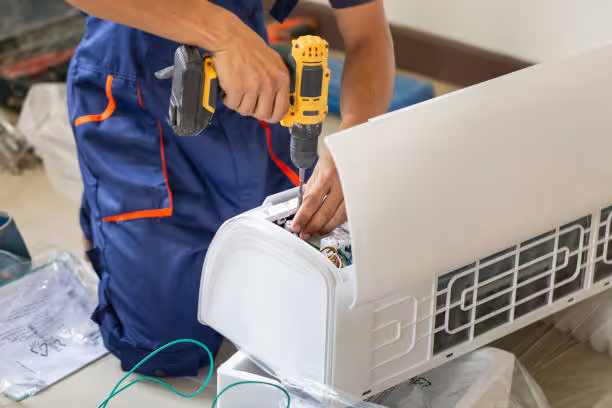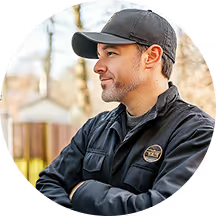Heating Repair in Riverhead, NY
Keeping your heating system reliable through Riverhead winters is essential. Whether you have a gas furnace, oil furnace, heat pump, or boiler, timely diagnosis and skilled repair protect your comfort, safety, and energy bills. This page explains how professional heating repair in Riverhead, NY approaches common problems, diagnostic testing, typical repairs and parts replacement, emergency response priorities, and differences between residential and commercial systems so you can make informed decisions when your heat needs attention.

Why prompt heating repair matters in Riverhead, NY
Riverhead and eastern Long Island face cold, damp winters, salty coastal air, and occasional nor’easters that stress heating equipment. Older homes in the area often rely on oil or propane furnaces while many newer or retrofitted properties use heat pumps. Delaying repairs can:
- Raise heating costs through inefficient operation
- Cause uneven heating and frozen pipes in cold snaps
- Create safety risks from cracked heat exchangers or gas leaks
- Lead to larger failures and costly replacements
Common heating repair issues in Riverhead, NY
Homeowners and businesses here commonly report:
- No heat or intermittent heat — often caused by thermostat issues, faulty ignition, or control board failure
- Poor airflow or weak heat — clogged filters, failing blower motors, duct leaks, or blocked vents
- Heat pump not switching to heating mode or frosting up — low refrigerant, defective reversing valve, or stuck defrost cycle
- Frequent cycling or short cycling — dirty flame sensors, improper airflow, or oversized equipment controls
- Strange noises — bearings failing in motors, loose panels, or combustion issues in furnaces
- Smells of gas or burning — possible gas leaks, electrical faults, or overheated components (safety priority)
- Carbon monoxide concerns — cracked heat exchangers or poor ventilation that require immediate attention
Troubleshooting steps homeowners can try safely
Before calling a technician you can check simple items:
- Verify thermostat settings and replace batteries if needed
- Check and replace dirty air filters
- Ensure circuit breakers and gas valves are on
- Confirm vents and registers are open and unobstructed
- For heat pumps, clear debris from the outdoor unit and remove buildup of ice or snow
If you smell gas or suspect carbon monoxide, shut off the system if safe to do so, ventilate the area, and follow local emergency guidance. These are safety actions, not repairs.
Diagnostic testing a qualified technician will perform
Professional heating repair uses methodical testing to find the root cause:
- Visual inspection of burners, heat exchanger, ignition components, vents and flues
- Electrical testing of controls, relays, capacitors, and safety switches
- Thermostat and control verification including wiring and calibration
- Airflow measurement and static pressure tests to identify duct or blower problems
- Combustion analysis on gas or oil systems to check efficiency and carbon monoxide levels
- Refrigerant pressure and temperature checks for heat pump performance and defrost cycle evaluation
- Temperature rise testing across furnaces to confirm correct operation
- Leak detection for refrigerant or fuel lines and inspection for corrosion from coastal conditions
Accurate diagnostics prevent unnecessary part replacement and ensure repairs address the true failure mode.
Common repair procedures and parts replaced
Typical repairs performed in Riverhead homes and businesses include:
- Thermostat replacement or recalibration to restore proper control
- Igniter or hot surface ignitor replacement on modern furnaces
- Flame sensor cleaning or replacement to stop nuisance shutdowns
- Replacing gas valves, pilot assemblies, or control boards when they fail
- Blower motor repair or replacement and capacitor swaps to restore airflow
- Heat exchanger assessment and replacement when cracked or compromised (safety critical)
- Refrigerant recharge and leak repair for heat pumps; replacing reversing valves or compressors when needed
- Repairing or replacing circulator pumps, expansion tanks, or boiler controls for hydronic systems
- Duct sealing and insulation to improve distribution efficiency and reduce heat loss
- Condensate drain cleaning or trap replacement to prevent water-related failures
Technicians will explain repair options and the tradeoffs between repair and replacement based on age, efficiency, and safety.
Emergency and rapid response considerations
No-heat calls during bitter weather, gas odors, and suspected carbon monoxide are top priority. Effective emergency response includes:
- Quick triage to identify immediate safety risks
- On-site diagnosis with mobile stock of common parts like igniters, capacitors, and thermostats
- Secure shut-down procedures or temporary fixes to protect the property until permanent repairs are possible
- Clear documentation of safety concerns such as cracked heat exchangers or gas leaks
In Riverhead, storm-related power and flooding risks can complicate repairs, so experienced technicians will factor local conditions into the response and recommend measures to reduce future storm impact.
Residential vs commercial heating repair
Commercial systems involve larger equipment, different control strategies, and code considerations:
- Commercial boilers, rooftop units, and packaged systems require technicians experienced with larger BTU capacities, multizone control, and regular compliance inspections
- Preventive maintenance and redundancy planning are more critical to minimize downtime for businesses
- Residential repairs focus on occupant comfort, efficient operation, and smaller footprint equipment like furnaces and heat pumps
Both markets benefit from timely diagnosis, quality parts, and documentation for warranties and regulatory compliance.
Preventive maintenance and long-term benefits
Regular maintenance reduces emergency repairs and extends system life. Recommended practices for Riverhead homes include:
- Annual heating tune-up before cold weather — combustion checks, safety tests, filter and blower inspection
- Replacing filters every 1 to 3 months depending on use and indoor air quality needs
- Sealing ducts and checking insulation to improve efficiency in older Riverhead houses
- Considering heat pump upgrades or supplemental systems where natural gas is not available
- Evaluating thermostat upgrades to smart thermostats for better control and energy savings
- Keeping outdoor heat pump units clear of debris, vegetation, and salt buildup
Timely repair combined with scheduled maintenance improves comfort, reduces energy costs, and protects against safety hazards.
Service area and local relevance
Heating repair in Riverhead, NY serves homeowners and businesses across eastern Suffolk County where coastal exposure, older housing stock, and mixed fuel types shape unique heating needs. Local technicians understand regional fuel availability, common equipment brands used in Long Island homes, and how winter storms affect service and equipment longevity.
Making informed decisions about repairs and replacements during or before the heating season preserves comfort and safety in Riverhead homes and businesses. The right diagnostic approach, prompt attention to safety signals, and regular maintenance will keep systems running efficiently through the coldest months.
Customer Testimonials
Hear directly from homeowners who trust Bobby O’s HVAC Inc. for fast response times, honest service, and lasting comfort.











